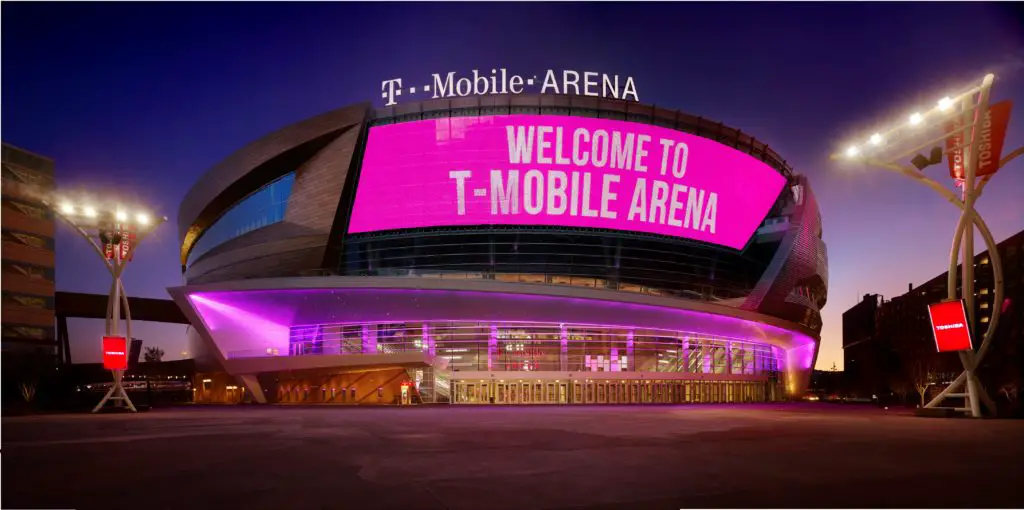
With the NCAA announcing the sites for its men’s Division I Frozen Four through 2026 on Wednesday, there was plenty for fans to be excited about and the ability to build up anticipation.
While three of the sites have hosted the event in the last 13 years – Saint Paul, Minn., Tampa and St. Louis – the fourth, a newbie to the national championship scene no doubt turns the most heads.
Las Vegas, for year a taboo to the NCAA and its events because of the city’s allure of casinos and gambling, will host its first Frozen Four at the currently shiny-and-new T-Mobile Arena. The hope, though, is the luster is still as attractive when the event lands on the ground in April 2026.
Mike Kemp, senior associate athletic director at Omaha and the chair of the Division I men’s ice hockey committee, said that one of the leading factors in selecting the four venues and host cities was feedback from the Frozen Four’s most loyal group of fans.
“We had interviewed the ‘season ticket holders,’” a moniker given to the large group of college hockey fans who travel to the Frozen Four year after year, some of whom have attended upwards of 30 Frozen Fours. “One of the underlying facts was that they really wanted a destination spot, so to speak. So that became a serious consideration as we looked at number of sites that were options.”
Leading that list is Tampa, which hosted in 2012 and 2016 and will again be host in 2023. Many scoffed at the idea of playing the championship in a warm-weather destination back in the early 2000s when Tampa was first awarded the 2012 bid. But the many who went south to attend either or both witnessed a first-class event. To me, at least, that one seemed like a no-brainer.
Slam dunk number two was Saint Paul. Three incredibly successful Frozen Fours at the Xcel Energy Center dating back to 2002 (and many at the Saint Paul Civic Center prior) underscored why this city was worthy. Add in the vibrant nature of the surrounding area, the charm of the State Capital and, most importantly, the rabid fans of college hockey in the Land of the 10,000 Lakes, this too seems like a simple decision.
The other two destinations – and I underscore the term destination – probably elicited a lot more discussion among the NCAA committee.
St. Louis, though not too far from college hockey’s Midwest, but still nearly six hours away from both Notre Dame and Wisconsin, couldn’t rest it laurel of just being a great college hockey market.
Indeed, the city of St. Louis, and particularly the arena district, have changed considerable since Michigan State captured the title there in 2007. The cities love for hockey was never more evident than the summer of 2019 when the St. Louis Blues brought home their first Stanley Cup.
The area around the Enterprise Center is built up and will possibly be more so by 2025 when the Frozen Four arrives. Of the four cities, this may have felt like the biggest stretch, but having been on the ground during the 2019 Stanley Cup run, I urge college hockey fans to give this one a shot.
Then there is Las Vegas, the shiny jewel that has attracted events of all kinds to the famed city for decades. Hockey is pretty much a newborn in this locale having debuted just three years ago this month. But the success of the Vegas Golden Knights helped build a local fan base. And the destination itself could make the 2026 Frozen Four the most sought-after ticket in the event’s history.
Besides just the obvious attraction of Sin City, there are other significant advantages for fans traveling to Las Vegas. Many major cities offer non-stop flights, multiple times per day. And the number of hotels and resorts – ranging from you $15/night worse-than-an-Econo Lodge all the way up to the most luxurious five-star accommodations available in the United States – Vegas will have something for everyone.
And while the NCAA might not want me to mention this, it’s highly possible you’ll be able to place a bet on your favorite team before each of the three tournament games.
See, winners all around!
Those cities that won’t be hosting…
As with every bidding process, there are always questions about cities that were not awarded the tournament.
I’ll start with the most obvious one, Detroit, which lost out on hosting in 2020 when COVID-19 led to the first-ever cancelation of the event.
According to Kemp, there was no easy way to accommodate placing Detroit into the rotation of tournaments. Neither Pittsburgh (host in 2021) nor Boston (2022) could move their events from their current years.
This is as tough a break as can be imagined for the city of Detroit and all of the organizers. These were folks ready to host this event and show off how much this city has changed. I know I was very much looking forward to returning to Detroit to see a city that has reimagined itself.
Then there are the cities that people consistently ask about. “Why hasn’t the NCAA picked Nashville?” “When is the Frozen Four heading back to Washington, D.C.?”
Well, that answer is a lot simpler. To be selected, you need to bid. Neither Nashville nor D.C. submitted a bid in this cycle.
Others have asked me about other cities like Denver and Columbus, both having hosted since the turn of the century and both solid college hockey markets. Though the NCAA couldn’t confirm that either city bid, sources tell me that both did.
Neither was selected. Sure, I know for the college hockey purist, they’d maybe prefer Denver over Tampa. But that shows just how much the event has – and continues to – evolve.
The reality is that the Frozen Four has become a spectacle, an absolute destination for fans and players alike. Sure, there main focus is the three hockey games, but now more than ever fans seem to be building larger agendas around their annual college hockey pilgrimage.
The reality is that in a bid process like this, there will always be winners and losers. But from this writer’s opinion, the committee got it right.


